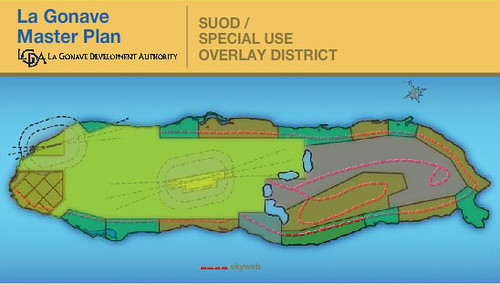A summary of the "La Gonave Master Plan":
The developer, Global Renewable Energy, claims to be focused on "alternative energy projects," and has already pitched the plan to "buy" the island of La Gonave to the Haitian government, yet a public disclosure of the status of any agreements is unknown outside of the principles involved.
The developers' first priority is to build a "crude oil refinery", "petroleum product tank farm", "food processing plant", and "industrial port" in the planned "industrial city", but they are promoting their project (Ironic at all to call it the "La Gonave Master Plan?") as an "island paradise and business mecca", that will be a "home for international business and the destination for world travelers." Why develop La Gonave? Because "Developers within the energy sector will be more likely to assume the risks due to the large profit margins that may be realized by them." GRE minimizes the environmental impact that an oil refinery on La Gonave will have, saying:
"The oil refinery is created from mini-refineries. This type of refinery has much less impact on its surroundings. The refinery will be located within the industrial city and visually isolated from the rest of the island by the Jatropha Plantation. Additionally, the refinery and industrial city are located on La Gonave's most western tip thus minimizing any impact on La Gonave. The prevailing wind direction is from the east. This prevailing wind direction will carry the minimal emissions out to sea to the west thus not negatively impacting La Gonave or the rest of HaitiWhen the project is complete in the 20 year span visualized by GRE, Haitians who remain on the island, will be 60% employed ("a large trainable workforce") by the project's proposed businesses (mostly the "industrial plantation"). Haitians might well ask, what of the 40% not employed? Also, what of the fact that local island residents will be hindered from traveling freely from/to the island because the only way to get there will be via a private executive airport or the large industrial dock for cruise ships?
The majority of the island (a 65,000 acre project) will be taken up by an "industrial plantation." Haitians should be concerned that the Republic of Haiti's government will only be designated as a "shareholder" in the proposed agreement. Who will be the civic authorities in this "island paradise"? It should be unacceptable that this "master" plan proposes a sort of Vatican City of the Caribbean with no official government oversight.
The master plan has no seeming plan to reimburse the people they will be displacing from their lands. In Haiti, there have been protests held in opposition to projects similar to this proposed plan, since they displace and disenfranchise the peasants by taking away their land. One example is this protest that was held in 2007 on World Food Day by peasant groups, who presented a petition against Jatropha plantations to the Haitian Parliament. The developers and the Haitian government (if this plan gets approval) can expect the same response. Haitian popular organizations will exercise their democratic rights and want a say in what happens to Haitian lands.
Haitians should put forth a competing idea or propose amendments that benefit the Haitian people. The plan might for instance, give a share of the profits from industries on the island to social services or the government could institute a minimum salary or dividend (like in Brazil or Alaska); or fund proper health-care facilities, schools, social services; or require that the locals form the governing body of the island; or that proper jatropha farming or other alternate energy form do not disturb the ecosystem of the island; or that a ferry system to/from the island be financed and run from a public fund.
A successful model of change that would empower Haitians is the model of Pandiassou. Pandiassou was an almost uninhabited, devastated region of Haiti, mired in erosion and despair, until Pandiassou was transformed [pdf] by the leadership of one man working with the local community:
"Frà �re Armand has both feet firmly on the ground. For example, on first arriving in Plateau Central, he quickly saw that the whole area needed reforestation.Guy Antoine, who runs the website Windows On Haiti recommends Pandiassou and the artificial lakes of Frà �re Armand as one of the top 10 places to see in Haiti before dying.
He rolled up his sleeves and, with the help of the peasants, replanted 200 hectares of desolate land. All this and more has been for the benefit of the people.
{...]In January 2008, the Haitian Government awarded Frà �re Armand a large contract to build 150 lakes nationwide over a 3- year period .
This recognizes his success in the Central Plateau and also makes water storage, aquaculture and dry-season supplemental irrigation new components in the country's long-term agriculture policy.
Frà �re Armand reports that news of the lake building program has reached as far as Africa where youths are writing that they want to come to Haiti to join the work."
Kà �mantà �: Vizite Pandyasou ak travay devlà �pman kominotà � Franklyn Armand reyalize yo, epi lamenm w'ap reyalize: a) Anri Kristà �f vivan toujou; b) ou pa kapab pà �di lespwa pou Ayiti. Avà �k vizyon e volonte de fà � nà �g ak fanm vanyan (tankou Frà � Aman), e byen tankou "Phoenix" la, Ayiti ap refà �t ankà �. Peyi dayiti bezwen anpil mirak natirà �l, tankou sa ekip ki antoure Frà � Aman an reyalize nan Pandyasou, se pa chite ajenou sà �lman ap lapriye gras mizerikà �d.Global Renewal Energy on the island's green energy potential: La Gonave "...is situated such that the Trade Winds blow across the narrowest portion of the island "[it is] Ideal for wind farm development." So why is that not the focus of their so-called "alternative energy projects" or "green energy potential" efforts? The reason is evident, the island is rich in oil reserves, so profit before people forms their primary focus. The preservation of the environment is not a priority.
Rough English translation:
Comment: Visit Pandiassou and the community development works Franklyn Armand has realized there, and on the one hand you will see: a) Henri Christophe still lives; b) we must not lose hope for Haiti. With the vision and willpower of men (like Father Armand), Haiti will rise like a "Phoenix" and be rebuilt again. The country of Haiti needs a lot of miracles, like the example set by Father Armand in Pandiassou, proving that getting on bended knee and praying alone will not end the misery.
[Guy refers to forum member Claudia's post: Pandiassou, Haiti] "I believe that the settlement of Pandiassou can serve as a model to the rest of the developing world because the local people are treated with respect, they are involved in the decision making process, and the vision of the project is long-term. I would love to see such a model put in place in some of the harder-hit regions of Africa. Pandiassou truly gives hope to the world."
Consequently, how ironic that GRE plucks out this rationalization as why an energy company is the entity best qualified to "run" the island, GRE says that: "Creating an island community that is focused on sustainable development through renewable energy requires an energy company to lead the project that has the skills to manage the island's renewable natural resources to meet human needs while preserving the environment."
Haitians should be concerned when they look at how disastrously an "energy company," British Petroleum (BP), handled the "preserving the environment" aspect of what GRE claims is an energy company's skillset. The fact is, if anyone needed more reasons why an energy company should not be given the power to run a so-called "plantation" industry community, then a story which ran today in the New York Times on the oil spill by BP: "Gulf Oil Spill Is Bad, but How Bad?," should be reason enough.






